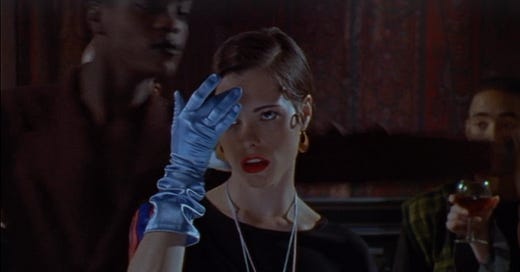From Issue 1 “Labor/Leisure”
Party Girl (1995) is the indie Legally Blonde (2001). Both movies are about the transformation of an apparently vapid young woman as she discovers her calling; but instead of a sorority president in Party Girlwe have Mary (Parker Posey), a star on the Lower East Side club scene of the 90s, and instead of becoming a lawyer she decides to become a librarian.
Her character development is more convoluted than Elle’s is in Legally Blonde, making for a less satisfying movie experience. She experiences numerous setbacks in the movie, several of them serious: getting arrested and then confronted by her godmother’s low opinion of her and her lifestyle, losing the attention of her romantic interest, losing her job at the library, getting evicted from her apartment, spinning out of control at a party and ultimately getting sexually assaulted by her ex. The movie fails to effectively dramatize these setbacks and her growth or change from them. Everything just happens, and she deals with the consequences as needed.
While this is a serious flaw in the movie, it may also be a product of what makes this movie special, a setting that feels totally authentic. Party Girl lacks the polish and structural strengths of a Hollywood product like Legally Blonde, but the way the story moves grows directly from the real lifestyles of people in downtown Manhattan. The absence of clear turning points, the variety of interactions and relationships with all kinds of people, and the matter-of-fact way Mary handles her problems without extra dramatic flair are pure New York, especially for those without a typical steady job. Every day feels like a journey that is totally different from any of the ones before, filled with overlapping storylines of lesser and greater importance without any clear anchor for it all.
The movie displays a real dedication towards portraying the downtown world it was shot in. Even the stock characters have aspects that seem drawn from real people. Mary’s gay best friend Derrick (Anthony DeSando) is not only fashionable and gorgeous and bitchy, as they always are, but also delusional over a man he had a one-night stand with and whose name he misremembers. This second aspect to his character convinces me that he was conceived from observing real gay men because while it serves no obvious purpose for the main story, it is true to life; the gay men I know, myself included, are exactly like this. Her other good friend Leo (Guillermo Diaz), a DJ trying to find work to make it big, has based his identity and self-worth on music to mask his insecurities. When he condescends to Mustafa (Omar Townsend), a Lebanese immigrant, halal stand worker and Mary’s love interest, for not knowing what “spinning” is then proceeds to tell him to bring his friends to his show, it was déjà vu. That exact interaction probably occurs at least twenty times every day somewhere within walking distance of the L train. Besides these two and Mustafa, Donna Mitchell’s performance as Rene rounds out the cast of notable side characters. Rene runs the hot club Leo wants to work in, and although the alcoholism portion of her character is cartoony, the scenes where she acts with icy authority as boss are just right.
The heart of the movie is Parker Posey’s performance. In true indie sleaze spirit, Mary’s clothing is fun and cool, outfits that someone living downtown might really have thrown together for style and playfulness without a care for maintaining a certain look or persona. She is vulnerable, emotional, confused, but also tough. She can look young and girly in a scene, then whip out the most peremptory voice at a moment’s notice. Her life is not extraordinary, but then she flirts brilliantly, or has a moment of deep self-reflection that makes clear that she is always thinking. Parker’s voice and her physical presence are addictingly abrasive. She is the opposite of ethereal and demands attention, never asking to be pitied and always daring others, including the viewer, to have a problem with her. But, because she is smart, pretty and has a good heart, she is never genuinely annoying. It makes sense she thrives in her social scene.
I didn’t watch this movie before I moved here, but I probably would have loved it, adding it to my collection of fantasies about life in New York. It captures the surface of what it’s like to be here, but it’s also a superficial movie. Mary supposedly finds her calling in the movie, but the gravity of such an endeavor isn’t convincingly portrayed. Eventually there will come cravings for something that speaks to her on a deeper level.





